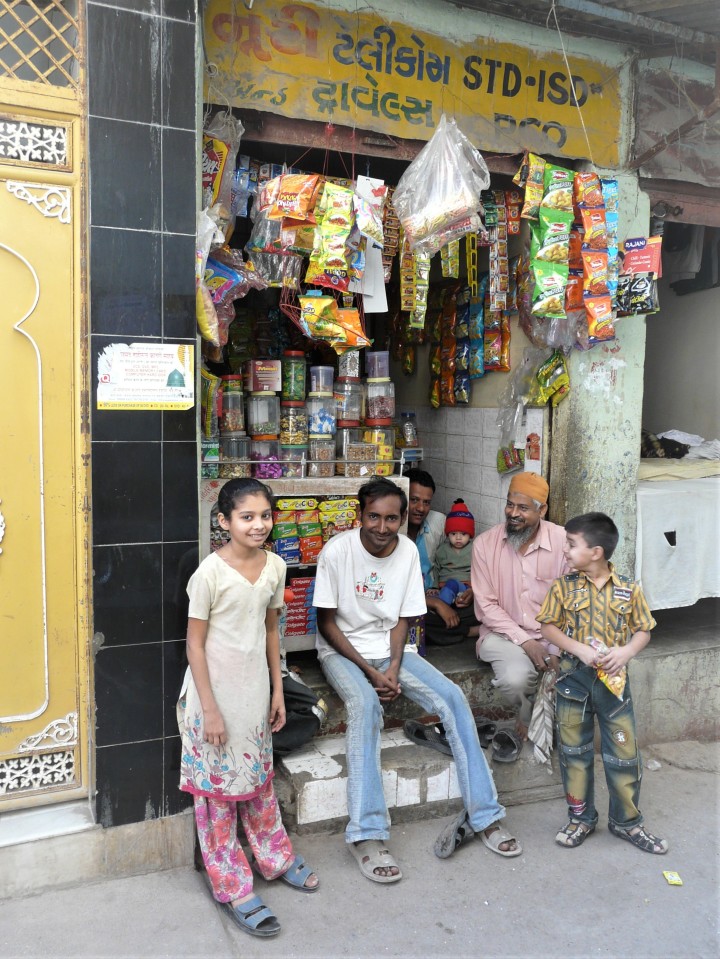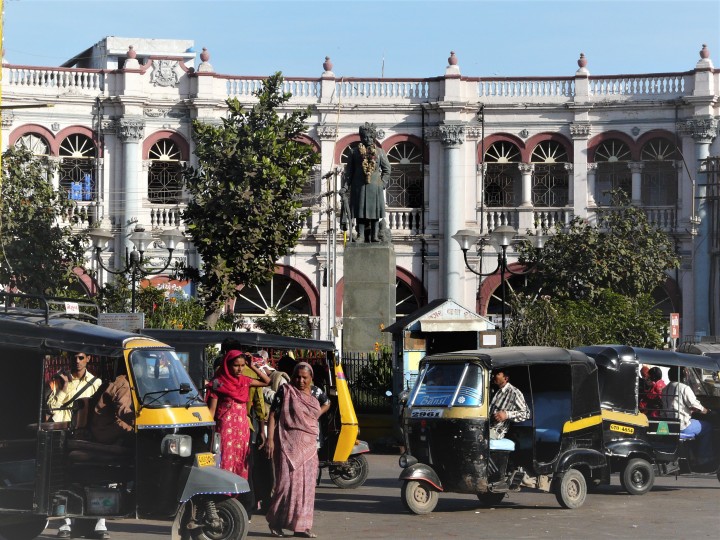Travelling from Junagadh to Jamnagar, Gujarat. 2009
The driver revved, revved, revved the engine. ‘And this thing has to go 200 km – I don’t think so’ said Jim. We were on private bus – Mahasagar Travels Ltd. – travelling from Junagadh, hopefully to Jamnagar. We moved about 200 m and stopped for another five minutes of serious revving. The whole bus vibrated. The window panes hummed faintly against the frames. Slowly, we inched forward and were underway.

There is always a feeling of excitement setting off for a new place, a sense of anticipation, who knows what the journey and the destination will bring. Echoing my feeling, the driver gave a celebratory toot of the horn – ‘toot-a-toot-toot-toot’ – now we were making progress.

On the outskirts of Junagadh, squalid ‘tents’ clung to the edges of small settlements. No more than plastic tarpaulins strung over a branch or a bamboo pole, walls of hessian sacking and bits of rubbish. Glimpses into the interiors revealed brown bare earth and a pile of rags for bedding. Nothing more. A man squatted on his haunches, arms outstretched, warming his hands over a smoky fire. Raggedy children played in the dirt. A boy, about eight or nine years old, pulled down his trousers to defecate. Clothes spread out to dry on bushes. A sea of litter threatened to engulf it all. Cows and egrets nosed through the debris, discarded plastic chai beakers, food wrappers and morsels of food. Women collected cow dung. Herders steered buffalo and goats towards the river, thin strands of bidi smoke rising into the air as they walked beside their animals. This wasn’t just Junagadh, this was anywhere and everywhere in India; a scene played out in thousands of places, thousands of times.

In Doraji schoolgirls cycled to school, their dupatta’s flowing out behind them. Long black hair gleaming, fastened into pony tails and plaits with neat hair clips and ribbons. One held the edge of her dupatta over her nose and mouth – protection from traffic fumes, or the smell of open drains – or perhaps simple habit. Gujarati farmers dressed in their customary white clothes, pleated jackets and jodhpurs, smock tops, turbans and gold earrings – carried milk cans on the backs of their bikes, and one held a sack of rice steady on the panier rack as he tried to manoeuvre through the traffic. I love bus journeys, watching India with all it’s beauty and ugliness; a constant paradox, pass by.
Every so often the driver gave another blast on the horn – a happy – ‘ta-ta-toot-toot-a-toot’ as if he was pleased the bus has made it so far. On the ticket, under ‘duration of journey’ it says seven hours. The guide book states the journey should take four, the man at the guesthouse told us five. How long is a piece of string? We stop regularly, sometimes to let more people board the bus, more often inexplicably – as if the bus needs a breather. A game of musical chairs is played as the new passengers search for their places. Seat numbers are written only in English and cause considerable confusion. Aside from these momentary disturbances our fellow passengers are quiet – most sleep, the two men behind me snore.
We break for chai and the toilet. Men sip steaming tea from saucers. Small stainless steel beakers are passed through windows to some of the women who remain seated. The ladies room offers just a smidgeon of privacy. There are four walls, but that’s it. A square area of concrete – no cubicle, no toilet, just a hole in the ground. A lady approached, saw me, and turned her back until I was finished. Not much privacy, but plenty of respect.
The bus rolls on. It gets hotter. A little girl wearing a lilac headscarf and a fake fur fleece coat (!) – bright orange with rough red spots – like a demented leopard – walks up and down the aisle, clutching the arm rests. She tugs at the scarf and her mother puts it in her bag. The child laughs and lays her head briefly in her mother’s lap.
We pass through a wonderfully green countryside. ‘But flat’, says Jim ‘I don’t like flat’. Sugar cane, white blobs of cotton, yellow flowers of the mustard seed, palms and cactus. The occasional field of marigold blooms and a bougainvillea trailing over a wall provide splashes of brilliant colour. I drink it all in.

All too soon the journey is over. It really was only four hours. No time at all.
Photos are not from this journey, but street scenes from anywhere and everywhere in India.
Wonderful descriptive writing. Took me right back to India in an instant. The beauty the ugliness, the poverty, the litter, the buses. The first photo is a winner.
Peta
LikeLike
Thanks Peta. Every time I read one of these old posts, I want to go straight back to India!
LikeLiked by 1 person
I know what you mean. We need to go back to Sri Lanka and are trying to decide whether to add some time in Rishikesh (which we never got to in all our trips to India) or Nepal, which would also be our first time. I have such a love hate relationship with India, as the noise and dust always do me in. But for Ben it’s love love love.
LikeLike
There’s a smidgeon of hate for me and a whole lot of love. We wanted to, but never made it Rishikesh (but reading Alison’s posts make me want to go) but Nepal is so gorgeous. Think you’d love it there. A much quieter version of India and the hiking is great. Although we were there before the earthquake.
LikeLiked by 1 person
Great smiles in photos 2 and 3! They look so relaxed and friendly, especially the guy with the tomatoes.
LikeLike
They do, don’t they?! Very often people in India just want to talk… someone told me once, they couldn’t afford to travel, so it was their way of getting in touch with the world.
LikeLiked by 1 person
Such great adventure you’ve had, Tracey! Love it!!
Christie
LikeLike
Thanks Christie. India certainly is an adventure!
LikeLiked by 1 person
We’ve been on so many of these broken down bus rides passing many similar garbage ridden communities. I have to say your flowing words make it sound nicer than my memories.
LikeLike
Ha ha, know what you mean! But in some ways these places are actually nicer on a bus, as you’re a bit removed!
LikeLike
Great storytelling. I so enjoyed this journey with you. It completely captured India in all its awfulness and wonderfulness. And yes, that bus trip could be anywhere in the country. I love India. We are headed there (Rishikesh) in less than 2 weeks for our fourth visit.
Alison
LikeLike
Oh enjoy Alison. I am already looking forward to reading your words and seeing your photos.
LikeLike
Love the description, felt like I was there 🙂
LikeLike
Thanks!
LikeLiked by 1 person
Beautiful images, hope u enjoyed our city Jamnagar and Junagadh streets too. Last image is of darbar gadh. Once it was administration office of king.
LikeLike
Thank you Hiren. We loved your Jamnagar!
LikeLiked by 1 person